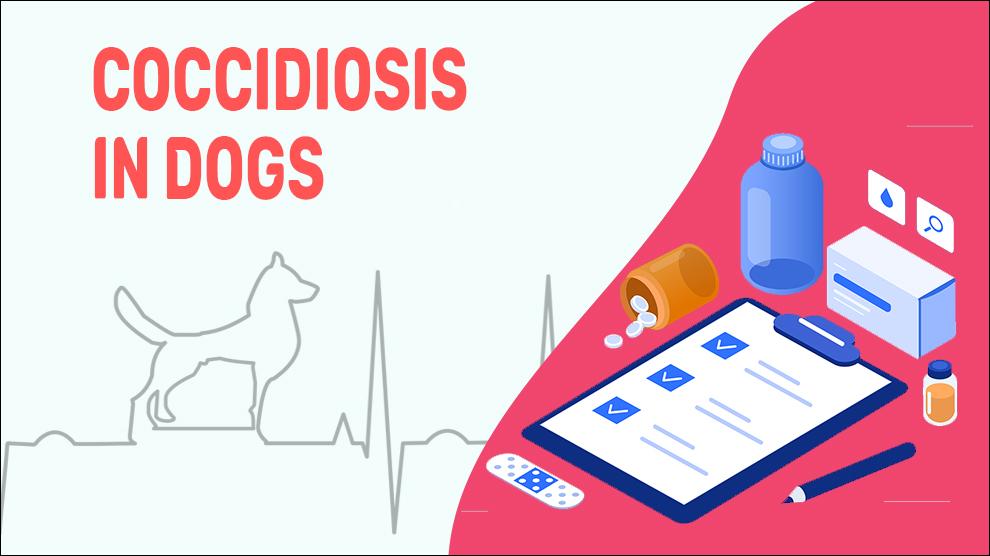Coccidiosis is a collective term for a range of pathologies involving the invasion and destruction of the intestinal mucosa by intracellular parasites of coccidia species. The gastrointestinal infections are caused by Cystoisospora species (formerly Isospera). No less than four different species of coccidia can infect dogs: Isospera ohioensis, I. canis, I. burrowsi, and I. neorivolta.
If a dog gets affected by pathogens of coccidia species, they may still go undetected as mostly the signs are nonspecific. The symptoms of intestinal parasites can be attributable to many different canine health problems.
Infected dogs pass oocysts in the feces and they are also found in feces contaminated soil. These oocysts (immature coccidia) can survive for a long time in the soil and are really resistant to harsh environmental conditions. Findings of coccidial oocysts in the feces of a dog without diarrhea are usually considered transient, inconsequential findings.
When the conditions are right such as humidity and temperature, these oocysts become infective ('sporulate'). When a puppy or a vulnerable dog ingests the Oocysts that are sporulated, the ‘sporozoites’ are released by oocysts in the lining of the intestine that initiates a sequence of infection in nearby cells.
When a dog consumes a coccidia-infected mouse, it also gets infected. Zoonotic transmission of Coccidia is not documented, which means that humans cannot contract coccidia from a dog.
Symptoms Of Coccidiosis
Treatment Options For Coccidiosis
Management of clinical signs is best achieved in the promptness of the treatment. Treatment should be initiated before the event of paralysis or contracture. Most Puppies typically die even with treatment and some adult dogs survive even without treatment.
Access the severity of the condition, look into your dog's bowel movements, and check whether the things escalate or clear up.
Contact your vet right away if your pet has frequent bouts of diarrhea in a short time period.
- A sulfa-type antibiotic called sulfadimethoxine - 5 - 25 days.
- Recently ponazuril is used.
- Metronidazole is used for diarrhea that is caused by coccidia.
- Disinfectants such as chlorine bleach- diluted [one gallon of water] to treat the surfaces and premises safely.
Home Remedies For Coccidiosis
- When your dog has had one or two episodes of diarrhea, don’t feed your dog for some time and let your dog recover (for 12 - 24 hours).
- Reintroduce a bland diet that requires minimal digestion for a day or two. Feed cooked white rice and little white meat such as chicken or fish.
- Offer each meal in small quantities every 3 - 4 hours - consider 2 tablespoons for small dogs and 3 or 4 tablespoons for larger dogs.
- When your dog is feeling good, slowly reintroduce its regular food.
Prevention Of Coccidiosis
- Takes steps to avoid contamination of livestock feed or feeding area with canine feces.
- When going for walks, keep your dog away from dust, sandy areas, and other areas in the woods.
- Maintain your lawn or garden. Keep it neat and clean to avoid unwanted complications.
- Herding dog's access to the feeding areas should be restricted, and pastures should be reduced.
- Feed high-quality food and exercise regularly.
Affected Breeds Of Coccidiosis
There is no breed disposition.
Additional Facts For Coccidiosis
- Causes:
Different Species of coccidia can infect dogs.
- Isospora canis
- Isospora ohioensis
- Isospora neorivolta
- Isospora burrowsi
- Mortality:
Coccidia infections are only rarely serious in adult dogs, that too in weak, immunosuppressed, or in debilitated animals. Coccidiosis is a destructive disease with a high case fatality rate in puppies and leading to serious sequelae (long-term complications). The mortality rate decreases with age.
- Diagnosis:
- Complete blood profile and urinalysis.
- Stool sample.
- Prognosis:
For mild infestation, once treatments have begun a quick recovery can be assured. If there is a severe infestation, it will take longer for your dog to recover.
Always adhere to your veterinarian's treatment plan and use medications as directed.
Most of the medications have to be repeated in two to three weeks to break the life cycle so that we don't just get it again from the same source.
When To See A Vet
It’s better to set up an appointment with your veterinarian if you notice:
- Diarrhea, with or without blood or mucus.
- Vomiting
Food Suggestions For Coccidiosis
- Lean Protein and Low-fat meats (ratio of omega-6 to omega-3 fats = 5:1).
- White Rice, Boiled boneless, skinless chicken breast meat.
- Potatoes and Pumpkin (canned or pureed).
- Probiotics (yogurt, Goat's Milk, fermented vegetables, kefir with live cultures).
- Mashed boiled potatoes, and carrots.
- Bananas, Apples, Seaweed.
Conclusion
Your dog may have coccidiosis and act fine. When it comes to your dog’s health it is always best to err on the side of caution. Any coccidiosis symptoms or diarrhea that doesn’t resolve should be investigated further by your vet so that he can determine the underlying cause and recommend the most effective treatment.

















